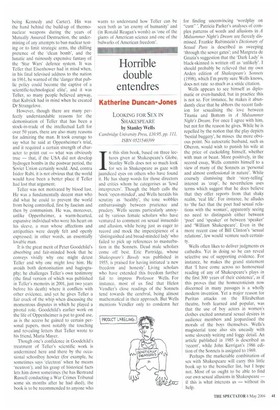Horrible double entendres
Katherine Duncan-Jones
LOOKING FOR SEX IN SHAKESPEARE by Stanley Wells
Cambridge Universily Press, £10.95, pp. 111, ISBN 0521540399
1 n this slim book, based on three lectures given at Shakespeare's Globe, Stanley Wells does not so much look for sex in Shakespeare as gaze with jaundiced eyes on others who have found it. He has sharp words for those directors and critics whom he categorises as 'lewd interpreters'. Though the blurb calls the book 'open-minded', and Wells heralds his scrutiny as 'healthy', the tone wobbles embarrassingly between prurience and prudery. Wells seems particularly annoyed by various female scholars who have ventured to comment on sexual innuendo and allusion, while being just as eager to record and mock the impercipience of a 'distinguished and broad-minded lady' who failed to pick up references to masturbation in the Sonnets. Dead male scholars come off best. Eric Partridge, whose Shakespeare's Bawdy was published in 1955, is praised for having initiated 'a new freedom and honesty'. Living scholars who have extended this freedom further fail to impress Professor Wells. For instance, most of us find that Helen Vendler's close readings of the Sonnets tend towards the cerebral, being almost mathematical in their approach. But Wells mentions Vendler only to condemn her
for finding unconvincing 'wordplay on "cunt" '. Patricia Parker's analyses of complex patterns of words and allusions in A Midsummer Night's Dream are fiercely dismissed. Frankie Rubinstein's Dictionary of Sexual Puns is described as sweeping 'through the sewer gates'; and Margreta de Grazia's suggestion that the 'Dark Lady' is black-skinned is written off as 'unlikely'. I should probably be relieved that my own Arden edition of Shakespeare's Sonnets (1998), which I'm pretty sure Wells knows, does not rate so much as a snide citation.
Wells appears to see himself as diplomatic or even-handed, but in practice this is not so. For instance, he makes it abundantly clear that he abhors the recent fashion for sexualising the love between Titania and Bottom in A Midsummer Night's Dream. For once I agree with him, but not for the reason he gives. While he is repelled by the notion that the play depicts 'bestial buggety', he misses the more obvious point. No autocratic husband, such as Oberon, would wish to punish his wife at the price of cuckolding himself, whether with man or beast. More positively, in the second essay, Wells commits himself to a view of many of the Sonnets as 'personal and almost confessional in nature'. While coarsely dismissing their 'story-telling' interest as 'crap', he nevertheless uses terms which suggest that he does believe that they offer reports from that shaky realm, 'real life'. For instance, he alludes to 'the fact that the poet had sexual relations with the woman', apparently seeing no need to distinguish either between 'poet' and 'speaker' or between 'speaker' and 'William Shakespeare'. Even in the more recent case of Bill Clinton's 'sexual relations', few would venture such certainty.
Wells often likes to deliver judgments ex cathedra. Yet in doing so he can reveal selective use of supporting evidence. For instance, he makes the grand statement that 'I have come across no homosexual reading of any of Shakespeare's plays in the first 300 years of their existence', as if this proves that the homoeroticism now discerned in many passages is a wholly modern invention. Yet a major reason for Puritan attacks on the Elizabethan theatre, both learned and popular, was that the use of boy actors in women's clothes excited unnatural sexual desires in audience members and jeopardised the morals of the boys themselves. Wells's magisterial tone also sits uneasily with some slovenly writing and foggy detail. An article published in 1985 is described as 'recent', while John Kerrigan's 1986 edition of the Sonnets is assigned to 1969.
Perhaps the marketable combination of sex with Shakespeare will carry this little book up to the bestseller list, but I hope not. Most of us ought to be able to find our own sexual allusions in Shakespeare — if this is what interests us — without its help.












































































 Previous page
Previous page